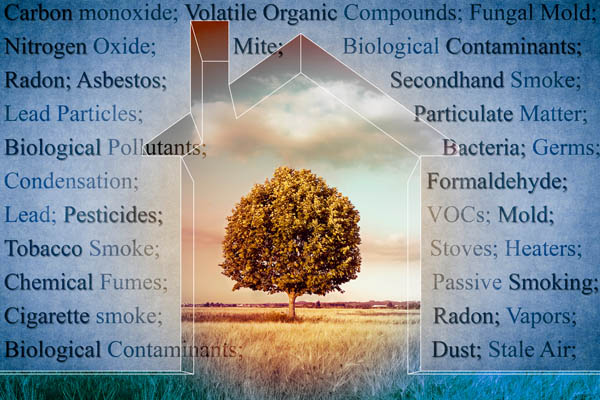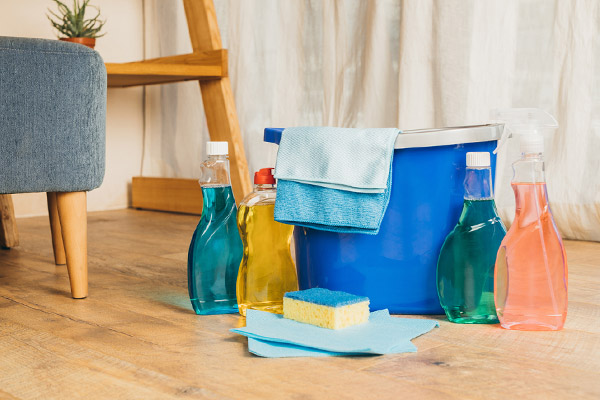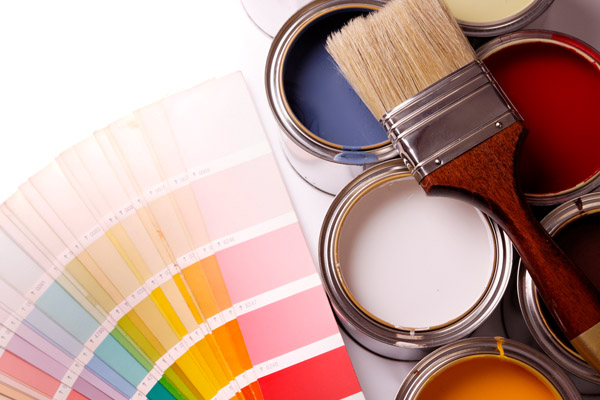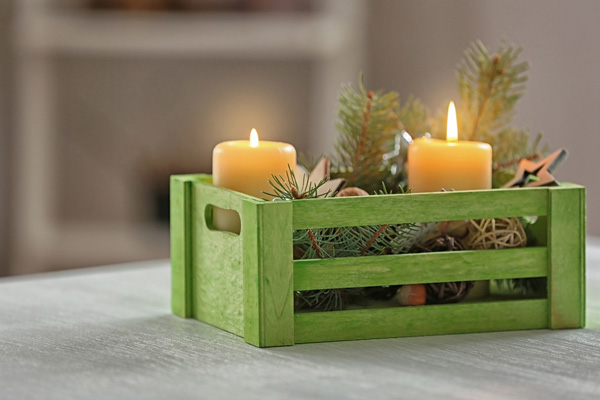6 Common Household Products That Pollute Your Home’s Air

No matter how clean you maintain your home, there is always room for making it cleaner and safer. If you have never thought about how to improve indoor air quality, now may be the time to take a closer look. Certain household products you may be using that are actually doing more harm than good. They lead to indoor air pollution within the home. This article discusses some of the most common household products that significantly reduce indoor air quality and what you can do instead.
What Is Indoor Air Quality?
Contents
Indoor air quality or IAQ is the condition of the air inside or around a structure, such as a residential home or a commercial building. It is related to the comfort and health of the occupants of that structure. With good indoor air quality, indoor air is easier and safer to breathe.
IAQ is a major concern for a home, especially where there are elderly residents, very young children, or people who are immuno-compromised. If indoor air has high levels of moisture and/or indoor air pollutants, it could lead to an increased risk of health issues. Such issues allergies and respiratory problems. This is the reason why homes and commercial buildings need to meet indoor air quality standards.
To eliminate indoor air quality issues, learn how pollutants invade the air inside your home. You might actually be using household products that significantly reduce the cleanliness of the air indoors.
Household Products That Affect Indoor Air Quality
Below, we share some pollutants that affect the quality of your indoor air at home.
Cleaning Products

Many commercial cleaning products are formulated with chemicals that can be harmful both to one’s health and the environment. Cleaning supplies may contain bleach, ammonia, VOCs (volatile organic compounds), and strong synthetic fragrances that reduce residential indoor air quality and cause a strong reaction, especially if they are mixed with other chemicals.
Solution: Learn how to improve indoor air quality naturally by choosing cleaning products that contain environmentally-friendly ingredients. You can also avoid those that contain harmful chemicals. If possible, learn how to use natural cleaners such as vinegar or baking soda.
Aerosol Sprays
Many products are sold as aerosol sprays – hairspray and hair treatments, deodorant, shaving cream, and fragrances. Even cooking oil in aerosol spray cans is a little suspect, thanks to the addition of chemicals such as artificial flavoring, propellants (including propane, isobutane, and butane), and a type of silicone to prevent the oil from foaming.
Aerosol sprays are designed to propel tiny droplets of liquid through the air. When this liquid contains harmful ingredients, it is unsafe to use. Aerosol sprays were exposed over 30 years ago as polluting substances and are considered a threat to the environment as well.
Solution: To avoid irritants in the air through aerosol sprays, limit their use, or avoid them if possible. Many products are available in other forms and you can use them safely with little to no effects on the indoor air quality of your home.
Paint

If you could smell fresh paint, then you are likely breathing in something that is not safe for your health. Paint, at least many that are still being sold and used, contain VOCs. VOCs contain carbon compounds that can easily turn to vapor. When they mix with the air, they react with other elements and produce ozone, which can increase air pollution. This is the pollution you breathe in because the paint will continue to release VOCs into the air as it dries.
Solution: Learn how to keep indoor air clean by choosing low-VOC paint. In fact, go out of your way to look for zero-VOC paint. Your lungs will thank you for it.
Air Fresheners
We have all grabbed a can of air freshener before to get rid of a bad smell but did you know that it also contains harmful ingredients? Some air fresheners can emit more than 100 different types of chemicals, many of which are toxic or harmful to health. These chemicals can also react with other elements in the air found inside the home and in turn produce more harmful compounds. Inhaling even a small amount of air freshener can even cause some people to cough or sneeze. If the mist comes in contact with the skin, it could even lead to redness, itchiness, and irritation.
Although it may seem contradictory that a product that supposedly “freshens” air can actually cause indoor air quality issues, it is not surprising. Air fresheners contain propellants, fragrance, and different types of additives that all contribute to the reduction of indoor air quality.
Solution: Improve indoor air quality by using natural ingredients to eliminate bad smells.
Candles

Candles may seem innocent enough but they do pose a risk to health. The good news is that not all candles are bad – only those that contain paraffin wax. Paraffin is a by-product of petroleum, shale, or coal oil. On their own, candles are probably harmless but when someone burns them, they release carcinogenic compounds into the air. In various studies, it has been found that candles made with paraffin wax can emit fumes that are linked to asthma and lung cancer.
Solution: Avoid regular use of paraffin wax candles. If using candles regularly, consider more natural ingredients such as beeswax or soy.
Dry Cleaning
Dry cleaning uses a type of organic solvent to remove stains, dirt, and unpleasant smells. Unfortunately, dry cleaning solutions can be quite harmful especially to people who have pre-existing health conditions that involve the lungs, kidneys, heart, or liver. The most worrisome type of ingredient that dry cleaning uses is PERC (perchloroethylene), which is a type of VOC. It is especially worrisome if exposure to the chemical occurs over a long period.
Solution: If dry cleaning is not avoidable, then unwrap dry-cleaned clothes outside your home. Leave them out to ventilate. This gives you the opportunity for your dry cleaning to release the harmful chemicals outdoors. Always go to a reputable dry cleaning business and do not hesitate to complain if you notice a strong smell on dry-cleaned clothes.
Conclusion

Proper indoor air quality management should include active awareness of the types of products that could lead to problems with indoor air quality. Maintaining safe indoor air is not only good for your health and safety but it is also a necessity for the proper upkeep of the environment. Small steps can make a huge difference and taking an active part will ensure that you can keep your home and its occupants safe and comfortable.
Call Point Bay Fuel For Superior Indoor Air Quality Solutions

Point Bay Fuel offers superior heating and cooling services in Ocean and Monmouth Counties, New Jersey. We hire the best NATE certified technicians who can provide you with excellent HVAC tune-ups, repairs, installations, and replacements. Each of our techs has the knowledge and experience to service your HVAC system correctly.
Point Bay Fuel guarantees the most competitive heating and cooling service costs in the area. Our services can improve your comfort, increase your energy efficiency while reducing your home cooling costs. Likewise, we can find practical solutions to improve your indoor air quality.
If you happen to need an HVAC repair or replacement system, we can recommend the best one for your home while staying within your budget. We back all of our work with a guarantee to ensure your satisfaction. To schedule a service appointment, give Point Bay Fuel a call today. We offer free, in-home estimates.
Contact us now by calling (732) 349-5059 to speak to one of our home comfort specialists!
